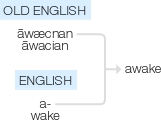Awake
Old English āwæcnan, āwacian, both used in the sense ‘come out of sleep’ (see a-2, wake1).
wiktionary
From Middle English awake, a shortened form of awaken(“awakened, awake”), past participle of Middle English awaken(“to awaken”). See verb below. Compare Saterland Frisian woak(“awake”), German Low German waak(“awake”), German wach(“awake”).
From Middle English awaken and awakien, from Old English āwacan and āwacian, equivalent to a- + wake.
etymonline
awake (v.)
"cease to sleep, come out of sleep," a merger of two Middle English verbs: 1. awaken, from Old English awæcnan (earlier onwæcnan; strong, past tense awoc, past participle awacen) "to awake, arise, originate," from a "on" + wacan "to arise, become awake;" and 2. awakien, from Old English awacian (weak, past participle awacode) "to awaken, revive; arise; originate, spring from," from a "on" + wacian "to be awake, remain awake, watch." For the first element, see a (1); the second element in both is common Proto-Germanic, from PIE root *weg- "to be strong, be lively."
Both originally were intransitive only; the transitive sense "arouse from sleep" generally being expressed by Middle English awecchen (from Old English aweccan) until later Middle English. In Modern English, the tendency has been to restrict the strong past tense and past participle (awoke, awoken) to the original intransitive sense and the weak inflection (awaked) to the transitive, but this never has been complete. For distinctions of usage, see wake (v.); also compare awaken.
awake (adj.)
"not asleep, roused from sleep," c. 1300, shortened from awaken, original past participle of Old English awæcnan (see awaken). Figurative use by 1610s.
